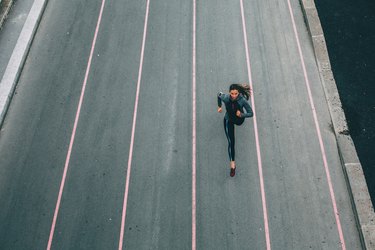
Experiencing twitching muscles after an exercise session is not uncommon, particularly if your muscles are fatigued or you are not getting enough electrolytes in your body. Taking measures to alter your workout routine and watch your diet can help avoid twitching in many cases. If your twitches persist, however, consult a doctor to rule out an underlying medical disorder.
Tip
Exercise can sometimes cause fatigued muscles to twitch.
Video of the Day
Muscle Twitching After Exercise
Muscle twitches, medically referred to as fasciculations, are contractions of part of a muscle, localized to a small area. According to the North American Spine Society, muscle twitches are very common in the calf, eyelid, thumb and thigh, and are essentially low-grade cramps.
Video of the Day
Muscle twitches are different than muscle cramps, which cause a sudden, painful muscle contraction. Muscle cramps might resolve quickly, but residual muscle soreness can last for days.
Unlike cramps, however, muscle twitches are not painful and usually only last for a few seconds, although they might re-occur during a period of several hours.
Causes of Muscle Twitching
Twitches can be caused by a variety of underlying issues. Although the exact reason post-exercise twitches occur is not clear, commonly cited causes include dehydration, muscle fatigue, electrolyte deficiencies and lack of a proper warm-up and stretching routine. Muscle twitches can also be caused by injury or overuse.
Muscle twitches can also be caused by stress. Practicing stress management techniques can help ease the twitches. In some cases, the twitching is a the result of overdosing on a drug, particularly caffeine, or is the side effect of a prescription medication.
Less commonly, a nervous system disorder or other underlying medical condition is to blame. Twitching caused by systemic disease often affects more than one area of the body and might be accompanied by other symptoms.
Read more: How to Stop Muscle Twitches
Treatment for Muscle Twitching
Most exercise-related twitches are temporary and go away without treatment. If they last longer or are particularly distracting, taking time to massage and stretch the affected muscle can help relieve the twitching. Resting the muscle and taking a hot bath can also help relieve the twitch.
Twitches that persist for more than a few minutes at a time or occur consistently outside of exercise may indicate an underlying medical problem. Consult a doctor if this is the case.
Prevent Muscle Twitching
To reduce the likelihood of muscle twitching after a workout, drink plenty of water before, during and after exercise. Hydrating after exercise with an electrolyte-enhanced sports drink can also help. Ensure you eat a nutrient-dense diet that contains plenty of electrolytes, particularly potassium and magnesium.
Read more: Muscle Twitches & Nutrition
Warm up before exercise and gently stretch your muscles, both after your warm-up and after exercising. Avoid drinking too much caffeine before exercising. Exercise at a steady pace, and make gradual changes to your regimen, avoiding sudden jumps in duration or intensity. Don't push your muscles to the point of fatigue, and stop exercising if your muscles get tired or sore.
Talk to your doctor about any medication you are taking to ensure twitches are not a side effect.